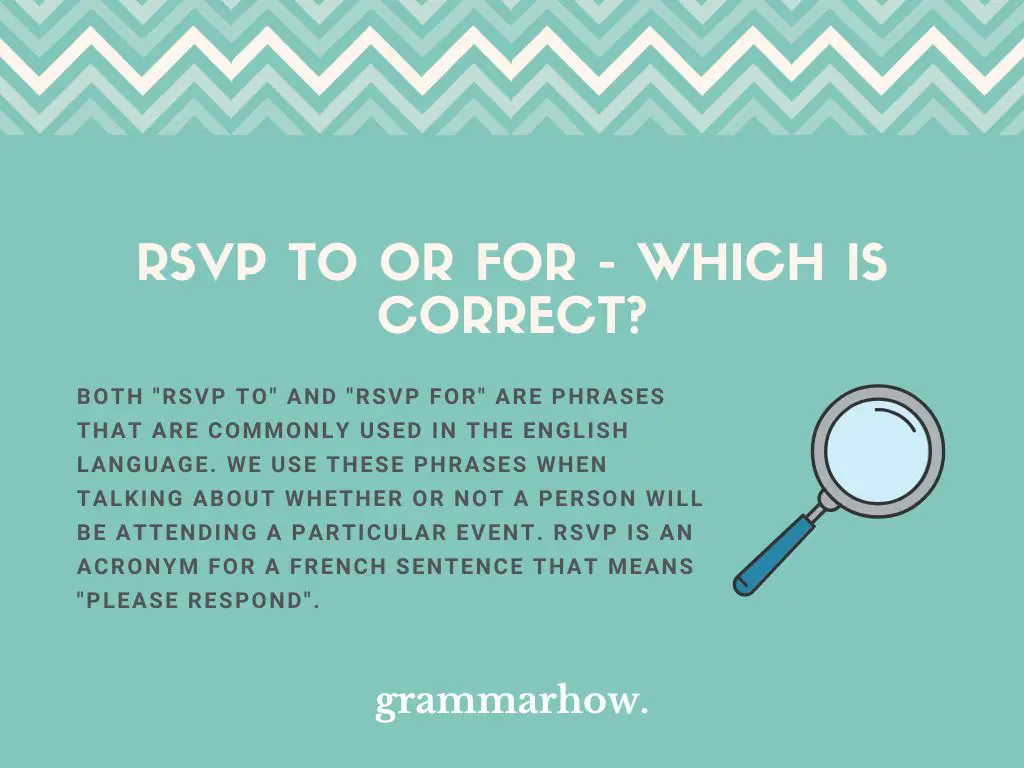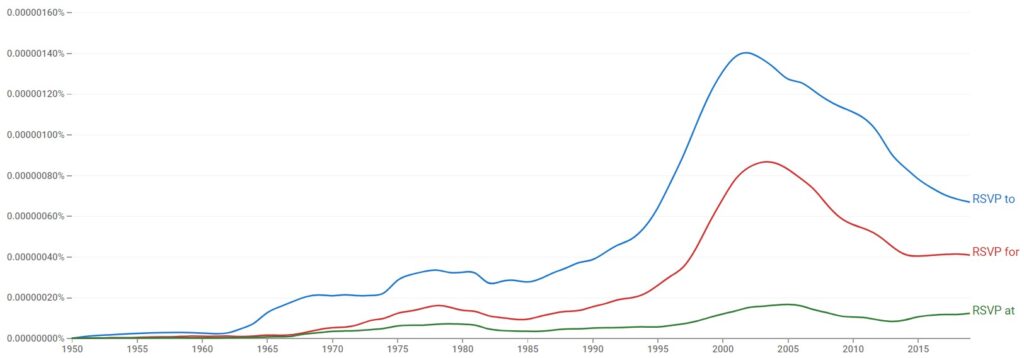The term “RSVP” is one of the most important terms you need to know when either planning a party or even just attending one. Read on to find out more!
RSVP To or For – Which Is Correct?
Both “RSVP to” and “RSVP for” are phrases that are commonly used in the English language. We use these phrases when talking about whether or not a person will be attending a particular event. RSVP is an acronym for a French sentence that means “please respond”.

“RSVP to” and “RSVP for” are often used interchangeably with one another, such as in the following example:
- Have you RSVP’d to Annie’s wedding yet?
- Have you RSVP’d for Annie’s wedding yet?
However, in the above example, the phrase “RSVP to” is the more grammatically correct phrase. The phrase “RSVP for” is more correctly used as follows:
- Please RSVP for me because I don’t think I’ll have the time to do it myself.
RSVP To
The phrase “RSVP to” is commonly used in the context of expressing an intention to be present (or to not be present) at a particular event.
The term “RSVP” is an acronym for a French phrase that essentially means “please respond”. Meanwhile, the preposition “to” is used to mean “in connection with”, according to the Cambridge Dictionary.
In its common usage in the English language, RSVP is often used synonymously with the word “respond”. As such, the phrase “RSVP to” is used synonymously with the phrase “respond to the invitation to [insert name of event here]”.
Below are some examples of how to use the phrase “RSVP to” in a sentence:
- I don’t understand why we need to formally RSVP to Camille and Daniel’s wedding when we’ve already told them that we’re coming.
- How do you RSVP to a birthday party?
- Why on earth do we need to RSVP to a three-year-old’s birthday party?
- Nancy really needs her guests to RSVP to her engagement party so she can start working on the seating arrangements.
- Carlos is asking everyone to RSVP to his daughter’s sweet sixteen.
RSVP For
The phrase “RSVP for” is often used in the context of responding for someone (e.g. a family member or a partner) in relation to their attendance at a particular event.
According to the Cambridge Dictionary, the preposition “for” has many uses, but it is used in this context to mean “intended to be given to” and “in relation to someone or something”.
While RSVP is an acronym for the French phrase meaning “respond please”, it is often commonly used in the English language as synonymous with the word “respond”. In line with this, the phrase “RSVP for” often means “respond for” or “reply for”.
Below are some examples of how to use the phrase “RSVP for” in a sentence:
- Please do not RSVP for your significant other(s) if they have not been invited to the party.
- What should I expect on an RSVP for a bachelorette party?
- Cameron is only asking for RSVPs for those who will not be able to attend.
- Should I RSVP for my cousin as well? You went to college with her.
- How long do we have to RSVP for a possible plus one to your wedding?
RSVP At
The phrase “RSVP at” is used when referring to the method of expressing your intention to attend (or not attend) a particular event.
The term RSVP is an acronym for the French “repondez s’il vous plait”, which means “please respond”. On the other hand, the preposition “at” is used to refer to a place, according to the Cambridge Dictionary.
In this context, the phrase “RSVP at” is used to talk about the method by which the host wants the invitee to express his or her intention to attend (or not attend) a particular event, such as through an email address.
Below are some examples of how to use the phrase “RSVP at” in a sentence:
- Please RSVP at my personal email address (nina.kim@email.com) and indicate how many people you will be bringing to the event.
- Don’t RSVP at my university email account because I don’t want my co-workers to attend this party.
- You can RSVP at the following numbers: 8888888 or 9999999 or 7777777.
- RSVP at my home address, please.
- Kindly RSVP at my wedding planner’s email address (weddingplanner@email.com) and indicate your estimated hair length at the time of the wedding (so that we can plan the arrangement for the wedding pictures).
Using RSVP Without a Preposition
It is correct to use the acronym RSVP without a preposition, as this is the original form of the saying.
According to the Cambridge Dictionary, RSVP is an acronym for the sentence “repondez s’il vous plait”. This is a French sentence, which, when translated to English, means “please reply”.
Whether in French or in English, it can stand alone as a complete sentence and does not need a preposition to be used correctly. In fact, it may even be argued that it is only used correctly without a preposition.
Below are some examples of how to use the acronym “RSVP” in a sentence:
- My 18th birthday party is on Saturday. Don’t forget to RSVP!
- RSVPs are necessary for a person to properly plan their party.
- At the end of the invitation to her ex-boyfriend’s wedding, was the acronym “RSVP” written in golden cursive letters.
- Please RSVP by Sunday or don’t bother coming to my bridal shower at all.
- You should RSVP and tell them what Harry told you.
Which Preposition Is Used the Most?
“RSVP to” is more commonly used than both “RSVP for” and “RSVP at”, based on data from Google Ngram Viewer.
Google Ngram Viewer allows us to compare how frequently certain words and phrases are used in a wide range of books.

Among the three phrases (“RSVP to”, “RSVP for”, and “RSVP at”), we can observe that the most popular phrase is “RSVP to”. This is based on data from books written in English that were published between the years 1950 to 2019.
“RSVP to” was at the peak of its popularity in the year 2001. It has, however, steadily declined in popularity since then. Still, compared to “RSVP for” and “RSVP at”, it remains the more commonly used of the three. t
The second most commonly used of the three phrases is “RSVP for”. Like “RSVP to”. it hit its peak in popularity in the early 2000s and has been steadily declining in popularity since then.
Finally, we have the phrase “RSVP at. Unlike the other two phrases, it did not hit a peak in popularity in the early 2000s. Rather, its usage has remained more or less steady since the late 1960s.
Final Thoughts
The term “RSVP” is an acronym for the French sentence “repondez s’il vous plait”, which means “please respond”. In the English language, it can be used as a noun or a verb. It can be seen in the following forms: “RSVP to”, “RSVP for”, RSVP at” or without a preposition.

Martin holds a Master’s degree in Finance and International Business. He has six years of experience in professional communication with clients, executives, and colleagues. Furthermore, he has teaching experience from Aarhus University. Martin has been featured as an expert in communication and teaching on Forbes and Shopify. Read more about Martin here.
